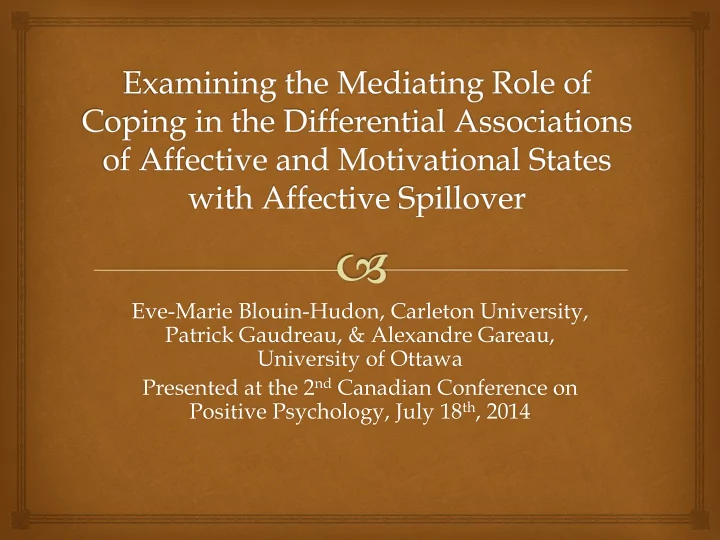

Eve-Marie Blouin-Hudon, Carleton University, Patrick Gaudreau, & Alexandre Gareau, University of Ottawa Presented at the 2 nd Canadian Conference on Positive Psychology, July 18 th , 2014
Self-regulation as a priority Understand simultaneous contribution of goal motivation and affective states in predicting coping with academic stressors. In turn, examine the contribution of coping strategies on affective experience.
Coping “Cognitive and behavioural actions used by individuals to manage stress that is perceived as exceeding the resources of the person, while minimizing its emotional impact” (Lazarus & Folkman, 1984).
Coping Disengagement-oriented strategies: emotional venting, behavioural disengagement, and denial. Orient one’s attention away from the task. Predict poor adjustment to college and greater distress when managing a stressful situation.
Coping Task-oriented coping: active coping, planning, increased effort, positive reappraisal, and relaxation. Generate a sense of mastery and control Predicts increases in achievement, optimism, and well-being, positive affect.
Positive Affect Pride, joy, interest, love Patterns of thought to enhance cognitive flexibility and creativity (Fredrickson & Joiner, 2002)
Negative Affect Worry, dislike, guilt Narrows scope of attention and can impair social and cognitive development (Fredrickson, 2001)
Broaden-and-build theory (Fredrickson, 2001) Pleasurable engagement - positive affect should fuel ability to cope with stressful and negative situations in a more task-oriented manner. Unpleasurable engagement - negative affect should fuel the impulse to disengage from stressor.
Self-Concordance Model (Sheldon & Elliot, 1999) Autonomous motivation: goals pursued in respect with a person’s intrinsic values, interests, passions and beliefs Controlled motivation: goals pursued in order to avoid guilt and/or in order to obtain or avoid something in return
Present study How can key assumptions of the Self-Concordance Model and the Broaden- and-Built Theory help us better understand academic coping? How can affect reciprocate through coping during an acedemic semester?
Hypothesis 1a Positive Task Affect Coping Autonomous Motivation
Hypothesis 1b Negative Affect Disengagement Coping Controlled Motivation
Hypothesis 2a Task Positive coping Affect
Hypothesis 2b Negative Disengagement Affect coping
Hypothesis 4a Positive Affect Positive Task Affect coping Autonomous Motivation
Hypothesis 4b Negative Affect Negative Affect Disengagement coping Controlled Motivation
Method Short-term prospective study Following students before the first set of midterm exams (early October; Time 1) and after the second set of midterm exams (late November; Time 2.) The sample included 272 students (79% females and 21% males) 163 completed both the Time 1 and the Time 2 questionnaires, yielding a retention rate of 64%.
Results Positive Positive Affect Positive Affect Task Affect coping Autonomous Motivation Negative Negative Affect Affect Negative Disengagement Affect coping Controlled Motivation
Conclusions Fredrickson’s (2001) spillover hypothesis : Enhanced psychological resilience from positive affective states are more likely to demonstrate subsequent increases in positive affect. Positive affect + autonomous goals: Complementary resources to facilitate a broadened form of self-regulatory effort when facing stressful situations.
Conclusions Future work: Determine if a sequence from task-oriented coping via goal progress could mediate the relation between autonomous goal motivation and change in positive affect states.
Implications Upward spiral towards emotional well-being (Fredrickson & Joiner, 2002). Translate to psychoeducational interventions?
Acknowledgements Social Sciences and Humanities Research Council (SSHRC) Patrick Gaudreau and Alexandre Gareau
References Lazarus, R.S. & Folkman, S. (1984). Stress, Appraisal, and Coping . New-York, NY: Springer Publishing Company, Inc. Folkman, S. & Moskowitz, J.T. (2000). Positive affect and the other side of coping. American Psychologist , 55, 647-654. Doi: 10.1037/0003-066x. 55.6.647 Gaudreau, P., Nicholls, A., & Levy, A.R. (2010). The Ups and Downs of Coping and Sport Achievement: An Episodic Process Analysis of Within- Person Associations. Journal of Sport & Exercise Psychology , 32, 298-311. Billings, D.W., Folkman, S., Acree, M., Moskowitz, J.T., & Tedlie, J. (2000). Coping and Physical Health During Caregiving: The Roles of Positive and Negative Affect. Journal of Personality and Social Psychology , 79, 131-142. doi: 10.1037//0022-3514.79.1.131 Thompson, A., & Gaudreau, P. (2008). From optimism and pessimism to coping: The mediating role of academic motivation. International Journal of Stress Management, 15 , 269-288. doi: 10.1037/a0012941 Burns, A.B., Brown, J.S., Sachs-Ericsson, N., Ashby Plant, E., Thomas, C.J., Fredrickson, B.L., & Joiner, T.E. (2008). Upward spirals of positive emotion and coping: Replication, extension, and initial exploration of neurochemical substrates. Personality and Individual Differences , 44, 360-370. doi: 10.1016/j.paid.2007.08.015
References Crockett, L.J., Iturbide, M.I., Torres, S., Rosalie, A., McGinley, M., Raffaelli, M., et al. (2007). Acculturative stress, social support, and coping: Relations to psychological adjustment among Mexican and American college students. Cultural Diversity and Ethnic Minority Psychology , 3, 347-355. doi: 10.1037/1099-9809.13.4.347 Carver, C.S., Pozo, C., Harris, S.D., Noriega, V., Scheier, M.F., Robinson, D.S, … & Clark, K.C. (1993). How coping mediates the effect of optimism on distress: A study of women with early stage breast cancer. Journal of Personality and Social Psychology , 65, 375-3 90. doi: 10.1037/0022-3514.65.2.375 Fredrickson, B.L. & Joiner, T. (2002). Positive Emotions Trigger Upward Spirals Toward Emotional Well-Being. Psychological Science , 13, 172-175. doi: 10.1111/1467- 9280.00431 Watson, D. (1988). The vicissitudes of mood measurement: Effects of varying descriptors, time frames, and response formats on measures of positive and negative affect. Journal of Personality and Social Psychology , 55, 128-141. doi: 10.1037/0022- 3514.55.1.128 Fredrickson, B.L. (2001). The role of positive emotions in positive psychology: The broadenand-build theory of positive emotions. American Psychologist , 56, 218-226. doi:10.1037/0003-066x.56.3.218 Sheldon, K.M. & Elliot, A.J. (1999). Goal striving, need satisfaction, and longitudinal wellbeing: The self-concordance model. Journal of Personality and Social psychology , 76, 482-497. doi:10.1037/0022-3514.76.3.482
Recommend
More recommend